Jul 2016
Tired seal pup seeks rest on Seattle's busiest beach
Jul/27/16 09:19 PM
This past weekend, the scene at Alki Beach in West Seattle was indeed a crazy one. The annual Alki Art Fair, with live music, art exhibits, craft and jewelry booths and food vendors, lined the crowded beach promenade. The many participants included Seal Sitters MMSN, where volunteers manned a booth displaying educational materials and a hands-on art project for kids.
Adding to the throng of people, there was a beach volleyball tournament taking place mid-beach with hundreds of participants and fans. A steady stream of people toting kayaks and paddle boards crossed the beach from Alki Kayak rentals and lingered offshore. Families picnicked and kids played in the shallows.
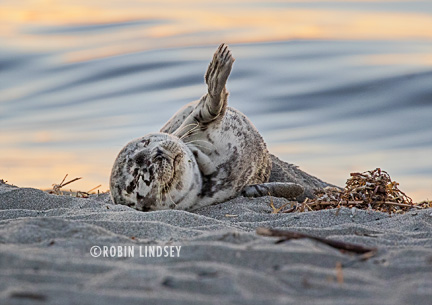 Amid all this chaos, a tiny and thin harbor seal pup sought sanctuary to rest and flopped ashore late Saturday afternoon - smack dab in front of the volleyball courts. First responders taped off the area and the young pup rested until dusk (stretching in the evening light, photo at left) before returning to Puget Sound.
Amid all this chaos, a tiny and thin harbor seal pup sought sanctuary to rest and flopped ashore late Saturday afternoon - smack dab in front of the volleyball courts. First responders taped off the area and the young pup rested until dusk (stretching in the evening light, photo at left) before returning to Puget Sound.
Over the course of three days, the pup nicknamed Little One came and went from the stretch of sandy beach at Alki, keeping Seal Sitters First Responders on their toes and requiring long hours of protection. Seal Sitters volunteers pitched in to help keep the pup safe on this beach, popular with sunbathers, swimmers and water sports - and (illegal) dogs.
Keeping kayakers and paddle boarders away was our most difficult challenge. The pup showed obvious signs of stress when these small vessels were within 50 yards of shore. Little One was too young to understand the dangers on land.
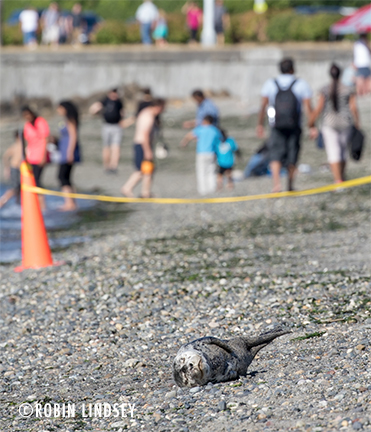 What could have been Seal Sitters’ worst nightmare of a pup on a crowded urban beach ended up being a fantastic few days with an appreciative and respectful public. In addition to folks from the Puget Sound region, our volunteers educated visitors from all over the U.S. and world, including China, Australia, Germany, Wyoming, Georgia, Philadelphia, Ohio, Texas, Oklahoma, Missouri, California, and Alberta, Canada. The many thank-you’s from these visitors and residents were perks to tired volunteers.
What could have been Seal Sitters’ worst nightmare of a pup on a crowded urban beach ended up being a fantastic few days with an appreciative and respectful public. In addition to folks from the Puget Sound region, our volunteers educated visitors from all over the U.S. and world, including China, Australia, Germany, Wyoming, Georgia, Philadelphia, Ohio, Texas, Oklahoma, Missouri, California, and Alberta, Canada. The many thank-you’s from these visitors and residents were perks to tired volunteers.
Each day, the pup lingered longer onshore. Late Monday afternoon, Seal Sitters’ Lead Investigator consulted with a marine mammal veterinarian and Stranding Network marine mammal experts about the pup’s thin condition, as well as the inherently dangerous location.
Working together to make a joint decision based on limited rehabilitation options, it was determined that the pup would be captured the following day. Little One would be relocated to a safer area, the closest harbor seal haul-out and rookery site, where the estimated 3-4 week old pup could potentially get adopted or even reunite with mom.
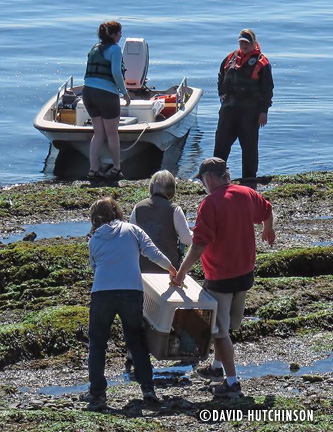 Little One came ashore very early morning the 4th day. She returned to the water twice - once due to kayakers too close and the second trip due a pesky, pecking seagull. Seal Sitters First Responders worried that they might not have an opportunity for a successful capture.
Little One came ashore very early morning the 4th day. She returned to the water twice - once due to kayakers too close and the second trip due a pesky, pecking seagull. Seal Sitters First Responders worried that they might not have an opportunity for a successful capture.
Finally, the pup finally settled in about 10 feet from the tide line. First Responders quietly crept along the water’s edge and picked up Little One. Only members of NOAA’s Marine Mammal Stranding Network are authorized to handle marine mammals, who are protected by Federal law. It is illegal for others to touch, feed, or move seal pups.
The pup was transported to a quieter location, where a boat with WDFW Marine Mammal Investigations Unit’s marine mammal biologist and volunteer was waiting to whisk Little One away.
The small female pup was examined, hydrated with fluids and Dextrose for energy and released at a seal haul-out, where up to 100 harbor seals gather at times. A red tag was placed on Little One’s rear flipper before being set free, in hopes of re-sighting her on the ridge of rocks situated safely in the Sound, far away from humans and dogs. We will provide updates if the pup is sighted during WDFW-MMI’s frequent surveys of the area.
Thanks to all of the Seal Sitters volunteers who showed poise and patience under trying circumstances in extremely hot weather.
We are grateful to our consulting partners in NOAA MMSN, most notably WDFW-MMI for literally going the extra mile to relocate the pup.
Special thanks to the many people who let Seal Sitters know when Little One came ashore on Saturday and Sunday, enabling us to protect the vulnerable pup as soon as possible.
Seal Sitters hotline received reports of two other pups on Sunday and Monday, but they could not be located when our responder arrived. Entering our hotline number, 206-905-7325 (SEAL), into your cell phone can mean quicker volunteer responses and help us protect seal pups in a timely manner.
Adding to the throng of people, there was a beach volleyball tournament taking place mid-beach with hundreds of participants and fans. A steady stream of people toting kayaks and paddle boards crossed the beach from Alki Kayak rentals and lingered offshore. Families picnicked and kids played in the shallows.

Over the course of three days, the pup nicknamed Little One came and went from the stretch of sandy beach at Alki, keeping Seal Sitters First Responders on their toes and requiring long hours of protection. Seal Sitters volunteers pitched in to help keep the pup safe on this beach, popular with sunbathers, swimmers and water sports - and (illegal) dogs.
Keeping kayakers and paddle boarders away was our most difficult challenge. The pup showed obvious signs of stress when these small vessels were within 50 yards of shore. Little One was too young to understand the dangers on land.

Each day, the pup lingered longer onshore. Late Monday afternoon, Seal Sitters’ Lead Investigator consulted with a marine mammal veterinarian and Stranding Network marine mammal experts about the pup’s thin condition, as well as the inherently dangerous location.
Working together to make a joint decision based on limited rehabilitation options, it was determined that the pup would be captured the following day. Little One would be relocated to a safer area, the closest harbor seal haul-out and rookery site, where the estimated 3-4 week old pup could potentially get adopted or even reunite with mom.

Finally, the pup finally settled in about 10 feet from the tide line. First Responders quietly crept along the water’s edge and picked up Little One. Only members of NOAA’s Marine Mammal Stranding Network are authorized to handle marine mammals, who are protected by Federal law. It is illegal for others to touch, feed, or move seal pups.
The pup was transported to a quieter location, where a boat with WDFW Marine Mammal Investigations Unit’s marine mammal biologist and volunteer was waiting to whisk Little One away.
The small female pup was examined, hydrated with fluids and Dextrose for energy and released at a seal haul-out, where up to 100 harbor seals gather at times. A red tag was placed on Little One’s rear flipper before being set free, in hopes of re-sighting her on the ridge of rocks situated safely in the Sound, far away from humans and dogs. We will provide updates if the pup is sighted during WDFW-MMI’s frequent surveys of the area.
Thanks to all of the Seal Sitters volunteers who showed poise and patience under trying circumstances in extremely hot weather.
We are grateful to our consulting partners in NOAA MMSN, most notably WDFW-MMI for literally going the extra mile to relocate the pup.
Special thanks to the many people who let Seal Sitters know when Little One came ashore on Saturday and Sunday, enabling us to protect the vulnerable pup as soon as possible.
Seal Sitters hotline received reports of two other pups on Sunday and Monday, but they could not be located when our responder arrived. Entering our hotline number, 206-905-7325 (SEAL), into your cell phone can mean quicker volunteer responses and help us protect seal pups in a timely manner.
Seal pups are popping out all over South Puget Sound
Jul/18/16 08:15 PM
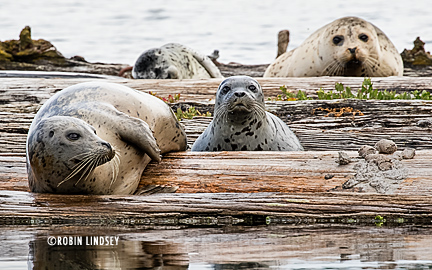
In the ideal world, pups are born on remote beaches, far from potential interference from humans and dogs. However, births also occur on marina docks, log booms, offshore platforms, boat launches and beaches popular for swimming and kayaking.
Shown in the photo here are two moms with their pups resting on a logboom breakwater near a marina. The chubby pup (center) appears close to being weaned and a small, newborn pup is in the background. Pups are generally weaned at around 4 weeks old.
Please respect wildlife’s need to rest and nurse their young. Whether you’re on land or in a watercraft, please keep your distance to avoid disturbance and possible abandonment. All marine mammals are protected from harassment by the Marine Mammal Protection Act. Visit Seal Sitters’ dedicated website page for more information on harbor seals and pups.
Seal pupping season in full swing - stay away from seals and pups!
Jul/10/16 07:17 PM
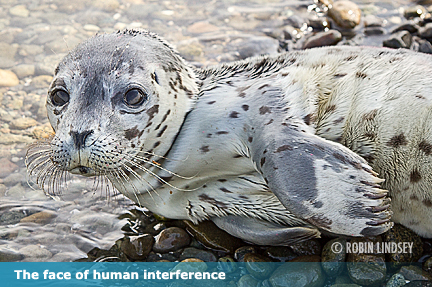
Nursing pups, however, are dependent on their moms for survival for the first 4-6 weeks of their lives. In the waters of Central and South Puget Sound, pups are born from late June through the first week of September (view a map of pupping season in WA). Always stay far back from any pup you come across.
A harbor seal mom, shy and wary of humans, will abandon her pup if people and dogs are around. Use common sense and help protect wildlife from harassment and abandonment.
YOUR PRESENCE CAN CAUSE STRESS AND ABANDONMENT
As you head for the beach, know that seashore revelry is definitely no party for harbor seal pups, who are seeking to rest onshore. Humans and dogs cause pups to be abandoned every year. A harbor seal mom often will not return for her nursing pup if there is a disturbance or perceived threat. It goes without saying that July fireworks cause animals to be abandoned every year.
If you find a spot for your picnic on a beach near a harbor seal, please move your picnic to another beach. There are reports of people with blankets and coolers surrounding a lone seal pup - finally calling the stranding network wondering why the mother did not return.
Weaned seal pups need space to rest undisturbed as well. A pup that is scared into the water wastes precious calories - and this can truly be the difference between life and death.
This is a reminder that when you venture out to the beach, whether by trail or boat, please respect animals’ space and need for quiet. Stay back!
SEALS ARE PROTECTED BY LAW FROM HARASSMENT
Please stay a minimum of 100 yards away from resting seals. Like all marine mammals, they are protected from harassment by the Marine Mammal Protection Act and Washington State law RCW 77.15.130 (a criminal misdemeanor, mandatory court appearance, punishable with up to 90 days in jail and up to $1000 fine).
STAY FAR AWAY FROM HARBOR SEAL HAUL-OUTS
Harbor seals gather in large groups this time of year at haul-outs (called rookeries during pupping season), where moms and pups find safety in numbers. Pups pay a terrible price for human disturbance. The seal pup shown above was found in 2012, starving on Cutts Island, along with two other emaciated pups and several dead ones. All had been abandoned by their mothers because boaters disrupted the seal colony on this small South Puget Sound island near Gig Harbor. Durning boating season, thousands of boats can be moored offshore at Cutts, disrupting this historic harbor seal haul-out.
A day of boating fun for people can be a death sentence for seal pups. When you are boating or kayaking, please stay far away from resting harbor seals.
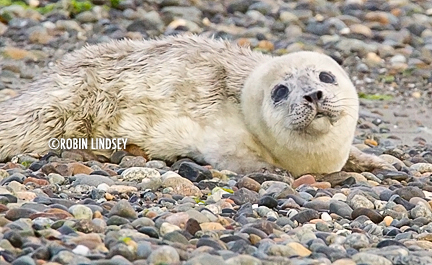
Please contact the stranding network to respond to a lanugo pup.
RESPECT NATURE AND STAY BACK
Leave seal pups be - don’t touch, move or feed them. If you are concerned about a pup, call the NOAA hotline @ 1-866-767-6114. To learn more about harbor seals and pups, visit Seal Sitters website here.







